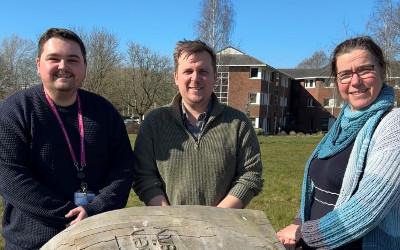Japanese fellowship recognises OU scientist's Mars atmosphere research

The Japan Society for the Promotion of Science (JSPS) has awarded Post Doctoral Research Associate Dr Juan Alday, a scientist in the ExoMars research group at The Open University (OU), a research fellowship to study the atmosphere of Mars.
Dr Alday will be conducting research at the University of Tokyo for nine months to better understand the isotope composition of Mars’ atmosphere using a combination of models and observations from the ExoMars Trace Gas Orbiter and ground-based telescopes.
The ExoMars Trace Gas Orbiter is the first mission of the European Space Agency’s ExoMars programme, designed to search and map gases in the atmosphere of Mars that are present in small concentrations.
JSPS provides fellowship programs for overseas researchers with an excellent record of research achievements to conduct collaborative research, discussions, and knowledge exchange with researchers in Japan.
Dr Alday, said:
“Isotopic measurements of Mars’ atmosphere can help us reconstruct changes in the past climate of Mars and better understand how and when liquid water could have flowed on the surface. However, to understand the past, we first need to understand how the isotopes in the present-day atmosphere are affected by different atmospheric processes.”
“It is an honour to have been awarded this fellowship. As an early career scientist, this is a great opportunity to build new collaborations with Japanese researchers and learn about new ideas and techniques to understand the evolution of the climate of Mars.”
In the mid-2020s, the Japanese Space Agency will launch the Martian Moons eXploration (MMX) mission to explore Phobos and Deimos, the two moons of Mars. One of the mission´s primary scientific goals is to clarify the origin of the two Martian moons and the evolution of the Martian system.
“The instruments on the MMX mission will also make isotope measurements to understand the evolution of Mars throughout history”, Juan continued.
“It would be very exciting to build collaborations with the MMX science team during my fellowship and contribute to the scientific output of this mission in the future.”
Juan joined the growing ExoMars research group in December 2021 after graduating with a Doctorate of Philosophy (DPhil), the University of Oxford´s PhD equivalent, to analyse data returned from the ExoMars Trace Gas Orbiter.
Dr Manish Patel, Senior Lecturer in the Planetary and Space Sciences, leads the OU ExoMars research group. He said:
“This award that Juan has won in an internationally competitive process is a testament to the excellent and internationally recognised space research being conducted at the OU. Juan is an excellent researcher and a credit to the team, and this chance to spend time in Japan collaborating with researchers is a fantastic career opportunity.”
The OU co-leads the NOMAD spectrometer on the ExoMars Trace Gas Orbiter mission and has significant involvement in the ACS spectrometer and CaSSIS stereo imager on the same mission, funded through support from the UK Space Agency
A version of this story, written by Laura Bandell originally appeared on OU News.
You may also be interested in:
Quarterly Review of Research
Read our Quarterly Review of Research to learn about our latest quality academic output.

Contact our news team
For all out of hours enquiries, please telephone +44 (0)7901 515891
Contact details